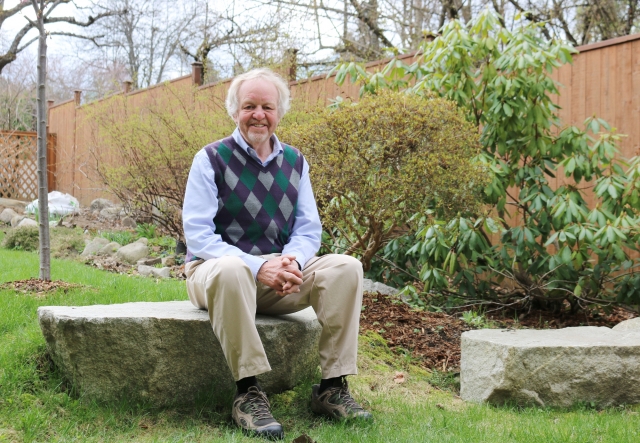Distinguished Educator John Armstrong Brings the World to the West Kootenay
Long before technology connected people from across the globe, John Armstrong was helping shrink the world through international education.
Armstrong began teaching at Selkirk College in 1980 and over the course of a 34-year career was a pioneer in post-secondary international education. The ethnic diversity in the West Kootenay-Boundary and thriving Selkirk International Department would not have been possible without the man who embraced the opportunity to make connections all across the planet.
“Getting to experience the international community and working to create that for others has been extremely rewarding,” says Armstrong. “Everybody who works in international education accomplishes this in different ways and at Selkirk College I think we have been able to help people in some parts of the world understand each other better.”
At this Friday’s Selkirk College Graduation 2015 Ceremony on the Castlegar Campus, Armstrong will receive the honour of Distinguished Educator for his tireless work to put international education on the map in our region.
“I loved it,” Armstrong says of his impressive career at Selkirk College. “It was stimulating, challenging and rewarding.”
An Approach Made for Rural British Columbia
Armstrong grew up in Vancouver and after graduating from Magee High School, attended the University of British Columbia in the late 1960s where he studied Political Science. After graduation, Armstrong worked physically demanding jobs in the resource and construction industries, learning survival skills for living in the country and traveled in Europe before returning to UBC to complete the qualifications for teaching elementary school.
Armstrong wanted to teach in a rural school and his first job was in the tiny Arrow Lakes community of Burton, north of Castlegar, where he taught in a three-room elementary school. Though he had family roots in the Burton area, after two years of teaching Armstrong moved to Nelson where he worked for the Canadian Pacific Railway.
It was while working for the railway that a friend told him about a one-month contract teaching ESL (English as a Second Language) at Selkirk College in Trail. That brief stint teaching refugees from Vietnam and Laos in 1980 turned into a flourishing career that lasted more than three decades and had a deep impact on the college.
“Teaching elementary school was really rewarding,” Armstrong says of his career shift that took place when he was 33. “But I was always interested in international politics, history and languages, and teaching at a post-secondary level… there was an opening and a chance at Selkirk College, so I took it.”
Building the Foundation of International Education
Armstrong’s approach to education and skills in the classroom were quickly recognized and he continued to teach ESL in Trail, but also became the Department Head of Adult Basic Education (ABE) from 1984 to 1986. In September 1986, Selkirk College welcomed its first influx of international students from Hong Kong and Macau. In 1988, Armstrong became the Department Head of International Education where he helped guide Selkirk College through a transformative era of its history.
“We looked after the whole student experience and we were unique in the province because most other colleges separated the ESL programs and teachers from the international student services, homestay and student recruitment side. They didn’t combine it all like we did,” Armstrong says. “It was all focused on the student experience and is still at the core of the way Selkirk College works with international students.”
As the department head, Armstrong was responsible for the ESL Program at the Castlegar Campus, helping develop the curriculum, corresponding with counterparts overseas, marketing the program and establishing relationships. Regionally, Armstrong supervised summer language programs in Grand Forks, Rossland and Nelson, as well as Castlegar. He also worked hard on developing partnerships in Hong Kong, Taiwan, South Korea and throughout Japan. Mixed into his duties, Armstrong spent time overseas at Aichi Konan College near Nagoya where he opened up a thriving sister college relationship.
“During the 13 years of John’s department head leadership, he was involved in all aspects of student success, from inspiring them to come to Selkirk from distant countries to welcoming and meeting some students when they arrived, to helping them overcome challenges and celebrating their successes,” says Shana Rablah, the current Department Head for Selkirk College’s International Education. “Selkirk College had a reputation for its personal touch to international education and this was mainly due to John fostering this approach, both personally and with all of his staff.”
Armstrong left the department head position in 2001 and resumed his teaching duties. In 2003—building on a Master of Arts degree from UBC—he joined three other Selkirk College colleagues in designing the TESOL Program (Teaching English to Speakers of Other Languages) which is an important aspect of today’s Selkirk International Department. During the final years of his post-secondary career he also continued to travel to Asia to teach and expand relationships, teaching again at Aichi Konan College, developing a project at Taiyuan Normal University in China, and maintaining contacts with other international educators through his participation in professional associations in South Korea and Japan.
“Throughout his years at Selkirk, John focussed on developing programs and curricula that enhance the English skills of international students and that encourage the growth of language teaching skills of Canadian and international students,” says Rablah. “These attributes along with his personal approach in supporting students and instructors have contributed to Selkirk College’s glowing reputation abroad.”
Proof is in Lives Impacted
In Armstrong’s nomination package for Distinguished Educator are 15 letters of support from former colleagues, college administration, students and international partners. In those letters Armstrong is described a quality educator, committed to students, a pioneer, dedicated to international education, kind, patient, a visionary, inspiring and a mentor.
“John wore many hats in his time at Selkirk College, but fundamental to everything he did was his commitment to community,” wrote ESL Instructor Robin Trudel, one of Armstrong’s former colleagues. “His concept of community was far reaching and centred on the building of relationships. In his role as an international educator and administrator, he inspired us with his vision to create international and intercultural learning opportunities that were rewarding for students and teachers, for the college and greater Castlegar region, and for many international institutions around the world.
On Friday afternoon Armstrong will be on stage at the Castlegar Campus to receive the honour of Distinguished Educator. Humble by nature, he smiles when thinking about the recognition but adds that what’s behind the piece of paper matters the most.
“This wonderful job gave me so many important opportunities,” says Armstrong, who retired last February at the age of 67. “What is really special are the many people who took the time to nominate me and write these letters of support. That they cared enough about what I have done and how I had influenced them in some way… that is really touching and I value that a great deal.”
Learn more about Selkirk International and join us on Facebook.

























Comments